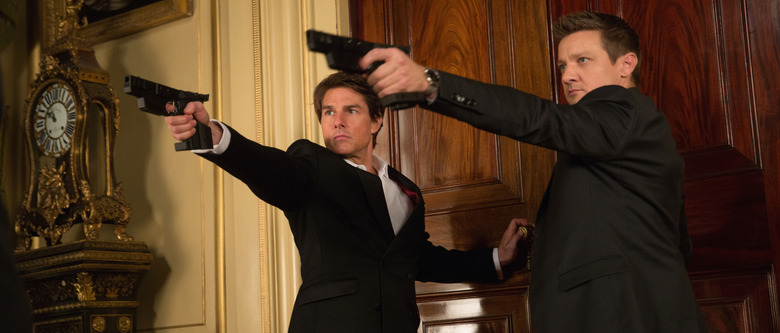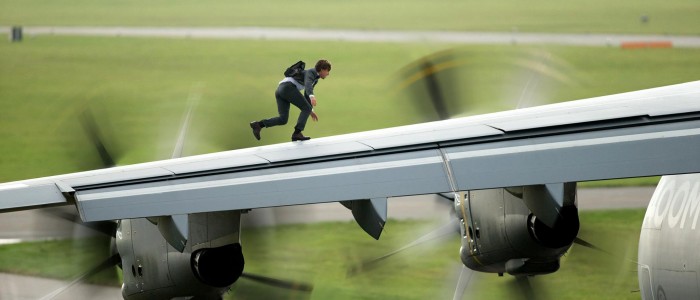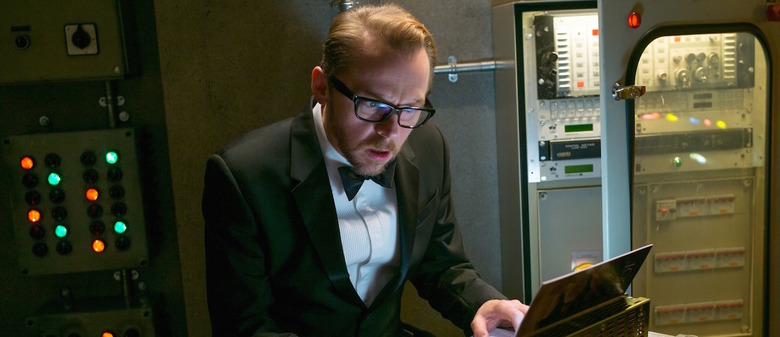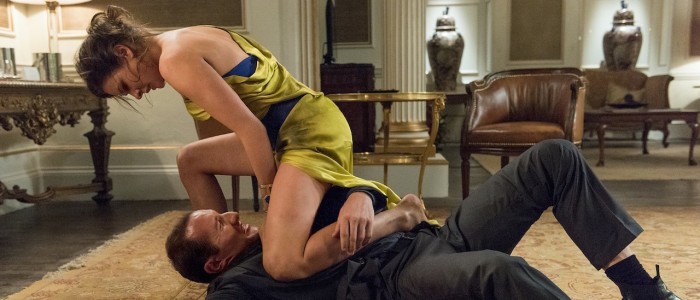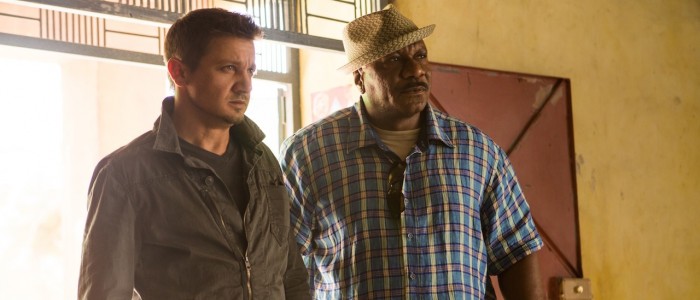'Mission: Impossible' Scores Another Big Win With 'Rogue Nation'
Any franchise could be forgiven for growing a bit stale after twenty years and five installments, but against all odds the Mission: Impossible series is still going strong. While the new entry directed by Chris McQuarrie may not be an all-time high, it's another solid entry that equals its predecessors in the stunt department, and features the most engaging new character since Simon Pegg and Philip Seymour Hoffman in III. Read our full Mission Impossible Rogue Nation review after the jump.
The Setup
As is often the case with these films, the plot of Mission: Impossible – Rogue Nation hardly matters. Mostly, it's just a convoluted excuse to ferry the characters and the audience from one breathtaking action set piece to another. But the basic premise is this: The IMF has been dissolved by new CIA chief Alan Hunley (Alec Baldwin), who (quite reasonably, though Ethan and company don't see it that way) points out that chaos tends to follow the organization, and that even their best results look an awful lot like luck. But Ethan remains a rogue agent out in the field, chasing after a shadowy organization known as the Syndicate.
His efforts rope in a few familiar faces: agents Benji Dunn (Simon Pegg) and William Brandt (Jeremy Renner), who now report to Hunley; and retired agent Luther Stickell (Ving Rhames). They also bring him in contact with two mysterious new figures: Syndicate head Solomon Lane (Sean Harris) and his right-hand woman Ilsa Faust (Rebecca Ferguson). From there, the characters jump from Paris to Vienna to Morocco to London in pursuit of each other and a certain crucial piece of information.
The Stunts
Given how much of the Mission: Impossible – Rogue Nation marketing has focused on that plane stunt — you know, the one in which McQuarrie and his crew literally strapped one of America's biggest movie stars to the outside of a moving plane — it's a surprise to realize it's the very first scene of the movie. What's more, it's not even close to its best action sequence. It's something like the fourth or fifth. That's not a knock on the scene, which is plenty fun, but rather a testament to those other scenes.
Particular highlights include an underwater sequence and an opera house scene. Cruise reportedly learned to hold his breath for six minutes at a time for the former, and it shows. McQuarrie does an effective job of building up the tension, keeping the takes just long enough to be uncomfortable. Even though there's no real chance of Ethan Hunt drowning halfway through the movie, it's hard to keep from gasping for air while watching him.
Meanwhile, the opera house scene makes such spectacular use of its setting, it raises the question of why more action movies aren't set in opera houses. The space is simultaneously expansive and claustrophobic. Ethan and his opponents tiptoe across catwalks, duck in and out of shadows, and rise and fall with the equipment. The lavish backdrop and swelling music — did I mention all of this is going down during a live performance of Turandot? — only add to the drama.
And that's not the half of it. If accelerating airplanes, claustrophobic water tanks, and backstage hijinks aren't your speed, there's also a car chase, a motorcycle chase, a foot chase, a knife fight, several shootings, multiple fist fights, and, of course, a mask gag.
***
On the next page: Ethan's old friends return, and the franchise introduces one of its best characters ever.
The Cast and Characters
While Rogue Nation loves its big moments, it pays attention to the little ones, too. After the action, the main appeal of Rogue Nation lies in its characters, starting with its still-spry leading man. That long chestnut mane looks a bit less convincing with every passing year, but otherwise his mind and body show no signs of showing down.
Still, even this Tom Cruise vehicle wouldn't be half as fun without the supporting cast. McQuarrie brings in some of the best from past films. Luther is the blunt force who'll call others on their bullshit, Brandt is the straight man with a deadpan sense of humor, and Benji's the overgrown geek who's still a bit starstruck by Ethan. After multiple installments, the cast knows their characters inside and out, and the easy chemistry they've developed serves Rogue Nation well.
Outside of Ethan's inner circle, Baldwin gets some truly spectacular line readings as the apoplectic, out-of-his-element Hunley. (The crazed expression on his face as he spits, "Hunt is the living manifestation of destiny!" is priceless.) And Harris is chilling as the coldly brilliant Lane. But the real standout here is Ilsa, whom we'll get to in the next section.
The Female Lead
As written by McQuarrie and Pearce and performed by Ferguson, Ilsa is equal parts hero, antihero, and femme fatale. When we first meet her, she's a questionable figure who's already a step ahead of Ethan. As we get to know her better, we realize she's every bit Ethan's equal in terms of strength, smarts, and skills. Finally, she reveals herself as something even better: a fully formed female character with motivations, an arc, and a personality all her own.
The relatively unknown Ferguson puts in a star-making performance as Ilsa. Her cool elegance and dry wit make Ilsa an immediately appealing presence — always a plus when one's job requires quadruple-crossing trained spies and killers. She's got a commanding physicality as well, resulting in a distinct fighting style that's more brutally efficient than pretty.
McQuarrie's eye also goes a long way toward shaping this badass character. In one early scene, Ilsa extends a bare leg from a sexy dress while getting into position for a kill. The moment could've been played as pure eye candy — here's a beautiful woman flashing skin — but his camera treats it more like a shirtless scene from a superhero movie. Yes, it's sexy, but it's also an effective reminder of how powerful and capable that body is.
In fact, at times Ilsa feels like the true lead of the movie. For a long stretch of the middle, it's Ilsa's actions that drive the plot, as Ethan hops from country to country in pursuit of her. It's almost akin to the way Furiosa is the protagonist of Mad Max: Fury Road, with Max just along for the ride. Mission: Impossible doesn't go quite that far, but it did enough to leave me dreaming of a spinoff with Ilsa at the center.
***
On the last page: How Mission: Impossible – Rogue Nation fits into our current movie landscape, and what makes the film so satisfying.
The Competition
Rogue Nation lands in theaters at a time when lovers of big-budget action are spoiled for choice. Mission: Impossible lacks the history of the James Bond franchise, the freshness of the Fast and Furious films, the nostalgic draw of the Terminator and Jurassic movies, and the devoted fandom of the Marvel and DC adaptations.
But Mission: Impossible does have an insane commitment to practical stunt work, which is no small thing in an era so reliant on greenscreen and CG. It would almost seem churlish to dislike Rogue Nation when Cruise is out there risking death for our amusement. Fortunately, McQuarrie makes sure Cruise's real-life daring translates into the most thrilling action scenes this side of Mad Max: Fury Road.
Mission: Impossible also benefits in some ways from a lack of serialization. While there are plenty of callbacks to other films, Rogue Nation is entirely self-contained. It feels odd to call Rogue Nation tight when it runs over two hours long, contains half a dozen major set pieces, and throws in more plot twists than are worth keeping track of. But it feels no obligation to pay off earlier films or set up future ones, and as a result it's free of that dreaded franchise bloat.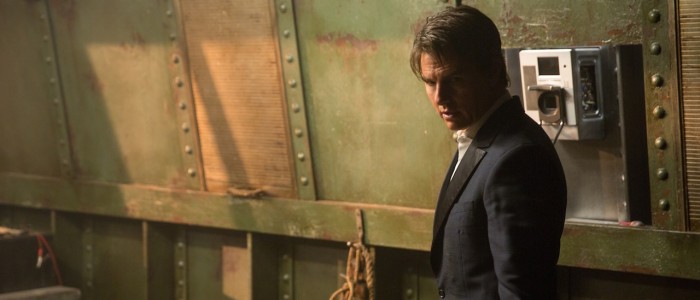
The Conclusion
On the other hand, Rogue Nation is also free of what makes a lot of great films click. It's not terribly concerned with complex character development or emotional resonance, for example, and it doesn't even try to offer deep sociopolitical commentary or moral lessons. Moreover, despite the looming threats of the Syndicate, the stakes never feel all that high. Rogue Nation's overall tone is so light, even by Mission: Impossible standards, that an unhappy ending is unimaginable.
The result is a film so airy, its memory begins to dissipate the second the credits roll. Two days later, I found I hadn't thought about Rogue Nation at all, even though I'd enjoyed every minute of it in the theater. There just wasn't that much to think about.
Then again, there's something to be said for a film that gives up its pleasures so easily. Rogue Nation is the epitome of a popcorn movie. Its only real aim is to entertain in the moment, and on that front it succeeds with flying colors. Each dazzling action sequence is followed by another, the laughs come easily and frequently, and though it's hardly a snap at 130 minutes, it's all over before it gets a chance to wear out its welcome. So what if Rogue Nation doesn't make for an interesting memory? It's a hell of an experience, and sometimes, that's enough.

